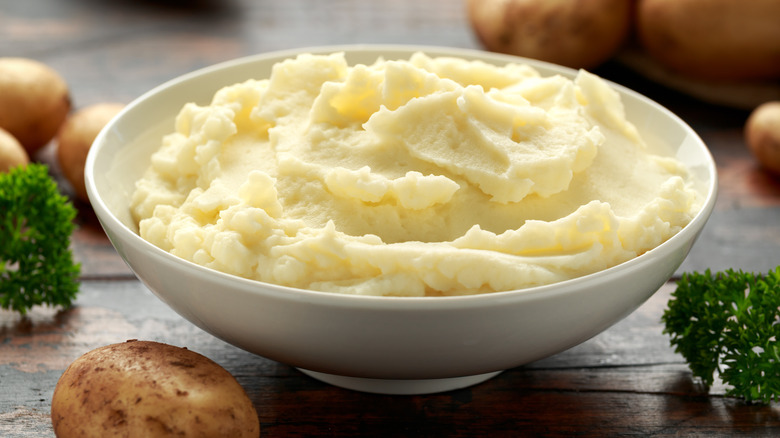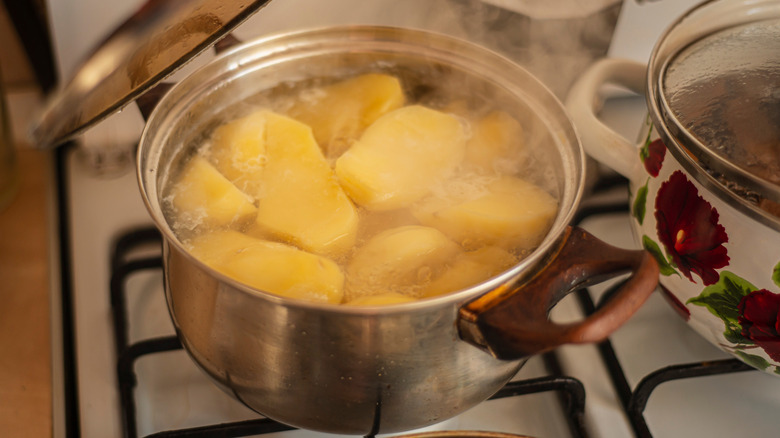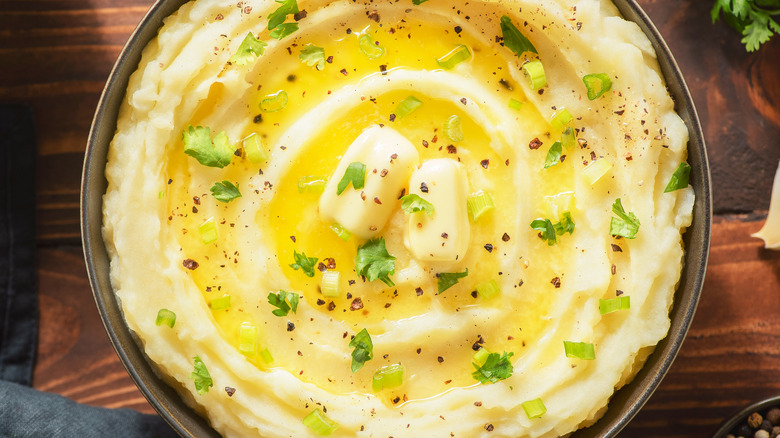Skip The Non-Dairy Milk Altogether For The Best Vegan Mashed Potatoes
A classic mashed potato recipe typically has three main ingredients: potatoes, butter, and a liquid dairy product such as milk or half and half. When it comes to whipping up a vegan version of this comforting side dish, there are plenty of substitutes for both of these non-potato ingredients that you can opt for. Non-dairy kinds of milk abound, from mainstays including soy and almond milk to newer varieties like pea milk and oat milk. But can any of these exchanges hold a candle to the real deal?
Although you can certainly get by with whipping soy milk into your mashed potatoes, some of the best vegan spuds you can make don't include any type of non-dairy milk, at all. Instead, you can mash those potatoes to creamy goodness using some of the water you cooked the potatoes in. This salty, starchy water will impart a smooth texture to your mash, as well as add back some of the potatoey flavors that may have cooked out in the boiling process. Simply reserve approximately 1 cup of the cooking water, and add it back into the potatoes as you mash them until you reach your preferred mashed potato consistency.
Reasons to avoid non-dairy milk in your mashed potatoes
When so many types of non-dairy milk exist, why would you go for starchy water instead of an actual milk substitute if you want to make vegan mashed potatoes? One reason you might want to avoid using non-dairy milk is its taste. Many non-dairy milks carry strong flavors that can clash with or even overpower the delicate flavor of the potato; milks like coconut, especially, have a stronger taste to them that can leave your mash tasting more like a tropical dessert than a savory side dish. Potato water, on the other hand, only carries the flavor of the potatoes that were boiled in it, and possibly a little added salt.
There are a lot of reasons you might want to hang onto any extra potato water, some might even be surprising. Potatoes are rich in nutrients such as iron, potassium, proteins, and B6 vitamins, so it stands to reason that potato water would be, as well. You can use the potato water to make a delicious gravy to pour over those mashed potatoes you just made, of course. Potato water is also a useful kitchen ingredient for any situation where you may need a bit of a thickener, such as soup or stew. Use potato water in dough for another layer of flavor; potato bread is a perfect example. Or, water your plants with your (unsalted) leftover potato water — it will water and fertilize them in one go.
What about the butter?
If you won't be using any kind of milk in your mashed potatoes, then what about using butter to achieve creaminess? Butter, or some other form of fat, is considered an essential mashed potato ingredient, adding both body and flavor to the spuds. If you want to keep your mashed potatoes vegan, using a plant-based butter substitute is possible, as it's the closest thing that provides the same flavor and texture as classic dairy butter.
If using vegan butter doesn't interest you, or you dislike the taste, you can always go with a different sort of fat, such as olive oil. Olive oil will impart a slightly floral, fruity flavor to the mashed potatoes while still keeping them moist enough to mash smoothly. Potatoes made with olive oil tend to be less dense and more airy than their buttery counterparts, so keep this in mind as you mash. Armed with the proper fat and a good glug of cooking water, you'll have the best vegan mashed potatoes on the table in no time.


